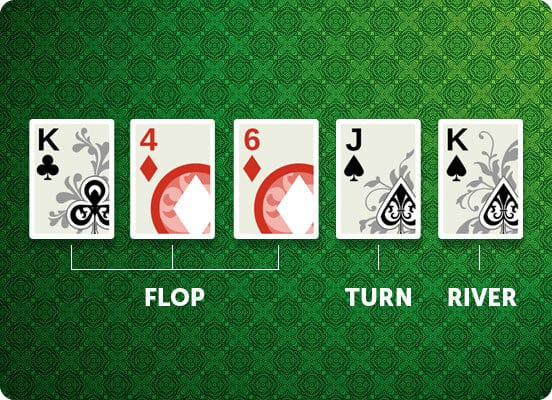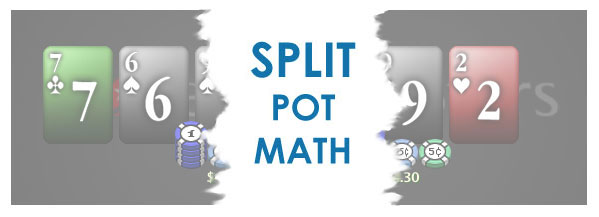Poker Regels Split Pot
A long list of poker variations generally abide by the split pot poker principle. Omaha Hi-Lo: Omaha Hi-Lo is the most popular of these games, where almost every game ends with a split pot. Here, split pots are often divided between the best high and low hand. Oct 08, 2020 Another player goes all-in with $50. Always start the Main Pot first with the shortest chips. Say out loud 'John has $45 four ways, plus the blinds. That will be $180 plus the $10 Blind. Mary has $5 more, 3 ways, that makes $15 in the first side pot. All the rest is in Side Pot #2.' You now have 3 pots. Any more betting goes into pot #3.

Jul 12, 2018 A tie goes to the runner in baseball, but a tie in poker results in a split of the pot. Just what constitutes a tie can be confusing. Before you join a Sit-n-Go or play live poker you should brush up on what constitutes a tie, so let's look at some examples. Is this a Tie at Texas Hold'em? What Does It Mean in Poker? A split pot refers to a pot that is shared by multiple players with equal hands and is also used to refer to games that award portions of the pot to both high and low hands, such as Omaha High-Low. « View All Poker Terms Take the Most Popular Quiz on Upswing Poker!
How to Split Pots
On the surface, splitting pots is easy enough: simply take the pot, split it evenly, and each player takes their winnings.
This is especially easy when two players have the same five-card hand: each takes half. If it's three or four or more players all with the same hand, divide the pot by the number of players, and each player collects their winnings.
But things can get tricky fast.
High-Low
In high-low games, the easiest split pot is when one player wins the high and the other wins the low. Here, you simply divide by two and each player collects their winnings. A player with the best high and the best low hand 'scoops' the whole thing.
But, especially in games like Omaha High-Low, when lots of players might all have the same low or the same high, the pot needs to be split along more complicated lines.
For instance, more than one player might all have the same low hand--this is easy enough if a board contains lots of low cards. On the other hand, multiple players might share the same high--for example, they are all able to make the same straight.
In these cases, the easiest way to manage the pot is to first split it in two: one high pot and one low pot. Then, the players who share the same high divvy up the high pot, and the players with the same low divvy up the low pot. (This is the same way you would divvy up a pot in a game like Chicago: split the pot in two, with one half going to the player with the high spade in the hole, and the other half going to the player with the best five-card hand--and yes, sometimes those halves get scooped by the same player!)
The most common example of this is quartering: two players have the same low hand, but one has a better high hand. So they split the low, and one player takes the high, so that one player gets 75% of the whole pot and the other gets 25%--a quarter. But it's not uncommon for three or more players to play for the same high or low, so players might get one sixth or one eighth or an even smaller fraction of the pot, while one player ends up take two-thirds of five eights for themselves.
Sidepots

When one player is all in, they can win the main pot: the pot that every active player can theoretically win. But other players can continue betting amongst each other by placing their chips into a side pot: a pot that only some active players can win. And yes, sometimes the side pots can get even bigger than the main one!

On the surface, side pots are relatively simple: the main pot usually gets stacked near the player who is all in, and the other two players can bet into the side pot. But, when multiple players are all in, there might be more than one side pot: for instance, a player is blinded all in, another player goes all in on the flop, and other players continue betting through the river and turn. Imagine what can happen if there are three or four or more players all in at the same time, with side pots stacked all around the table, while two big stacks keep betting into one another--complicated enough at a Texas Hold'Em table, and even more so at a High-Low game, where all those pots could get split up even more!
In these cases, the key is remembering who can win each pot. At casinos, this is simple enough, since the dealer sorts out each pot. But at home games, it's crucial to remember who can win each pot: every player can win the main pot, including the player who went all in first; then the next side pot can be won by everyone who could match the next all-in bet; and so on and so on. If it sounds complicated, don't be afraid to take extra steps to sort it out--if you play a lot of Omaha High-Low, you might consider keeping a pad and paper at the table!


5 Card Double Draw High-Low
There are different ways in which a Texas Holdem game would allow splitting a pot. Think of a case in which one of the players in a No-limit Texas Holdem game incorporates an ace-high straight. This scenario would imply that the board cannot be combined or paired and it is unlikely that there would be any flush possibilities, which means the player would have the nuts. In essence, the other player would have the same hand, which implies that the two players would have to split the pot. The implication would be either the players break even or potentially share the little winnings in instances where there are too may players in the pot.
In cases where they do, they would take the blinds back and continue to the next hand. This practice is common to avert the possibility of feeding the rake. It is noteworthy that blinds chopping goes against the rules in tournament plays. In addition, splitting could take place in the form of chopping the tournament. This occurs at the final table of the tournament when someone asks whether anyone “would like to chop”. In such scenarios, the asker would be making reference to the remaining prize pool.
He would be asking whether the players are still interested in equally dividing the prize pool amongst themselves. It is noteworthy that not every venue allows splitting although vast majority of them do. Every player who remains at the tournament is required to agree to a split. In some cases, it is impossible to equally split a pot since there may be a single odd chip leftover. It could also involve having two odd chips in case the chips are split three ways. Of particular note is the fact that the lowest denomination chip is always remaining in the game. There are definite rules that determine how the lowest denomination chip is supposed to be awarded.
However, in high-low split games like Omaha Hi-Lo Eight, odd chips would be awarded to the right hand. Nevertheless, the rules of the game would change considerably in other scenarios or games when the players have the same hand. In such instances, most venues give the closest player that is on the left of the dealer button the odd chip.
So when should the port be split. There are two distinct scenarios in which the pot in Texas holdem poker would be split. Key among them is chopping or splitting the blinds, which often takes place in cash games. In such scenarios, players would be allowed to split the blinds. This means that if action holds to a particular player in small blind, the player can ask the player in the big blind if they want to split.
All in all, split poker is only allowed in particular scenarios or tournaments. A pot in poker would be split in cases where players are interested in equally splitting the winnings. This would be the case where there is no scenario where any of them would win the game.